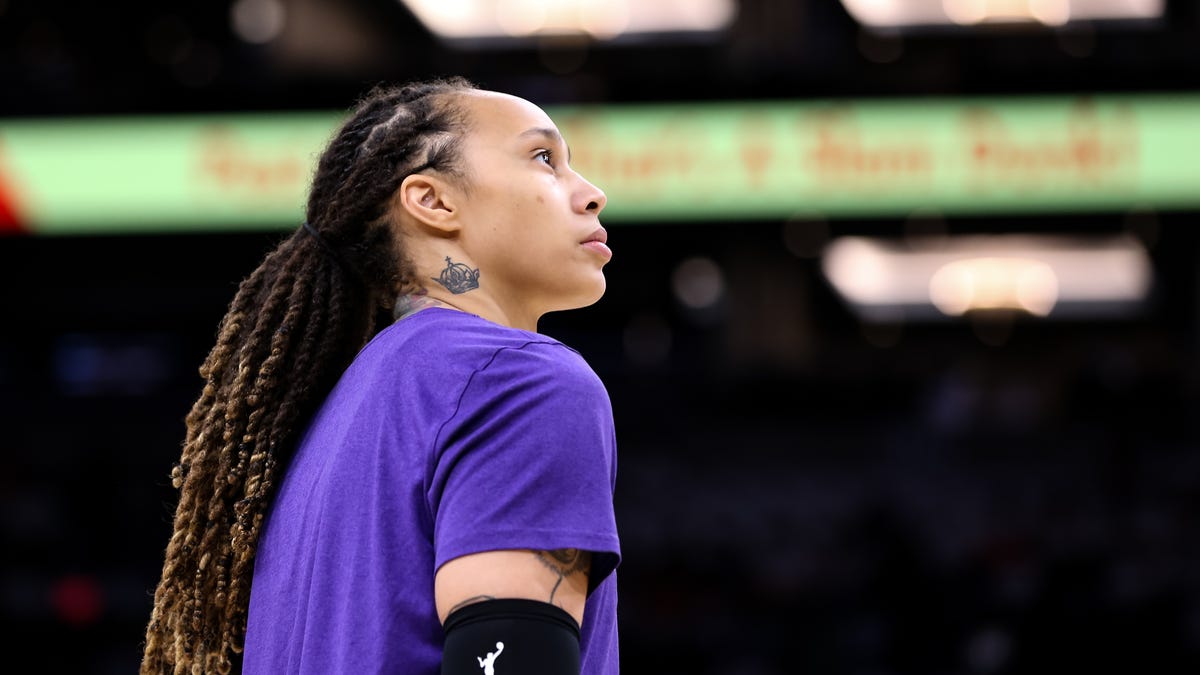

For the past two months, people around Brittney Griner and the WNBA have been low-key. The idea was that any loud calls to have the basketball star released from her Russian prison as Vladimir Putin launched an assault against Ukraine would only upset the authoritarian, and so the wise course was to work quietly and behind the scenes to release her.
It hasn’t worked.
Accused of having cannabis oil in her luggage at the airport on Feb. 17, Griner faces 10 years in prison in Russia. Her detention however, also serves as an undeniable flex of Putin’s power. The American and Olympian embodies many characteristics that he has tried to suppress in Russia, such as any discussion of untraditional gender expectations.
Griner, who came out in 2013 and has often spoken about how misunderstood she has felt over the years, stands at 6-foot-9 and has a raft of endorsements, including Nike. She is impossible to ignore even if she wanted to be invisible. She’s too famous, too tall, too uniquely Griner to be mistaken.
“This is an unimaginable situation for BG to be in,” WNBA commissioner Cathy Engelbert said Monday as reported by ESPN, which has done excellent reporting on this story. “She continues to have our full support. Certainly, we’re trying everything we can, every angle, working with her legal representation, her agent, elected leaders, the administration. Just everybody in our ecosystem to try and find ways to get her home safely and as quickly as we can.”
How independent is the judicial system in Russia? Putin’s leading opposition candidate Alexei Navalny is in prison again, after being convicted of embezzlement in trials that international watchdogs have declared flawed, and Amnesty International has determined Navalny to be a prisoner of conscience. He was poisoned with the nerve agent Novichuk in 2020, which resulted in western governments imposing sanctions on Russia.
Navalny was recently sentenced to additional years in prison.
This is a government that has no problem with making an example of a popular figure, and those working to free Griner are acutely aware of that. But at some point you have to admit that quiet diplomacy has not been effective and finally, earlier this week, several in Griner’s inner circle spoke out plainly on Griner’s plight.
Many women’s basketball players spend the offseason abroad. They play in Israel, Turkey, China, Italy, and Russia, and often in many different countries over the course of a career. The money is good, the fans are interested, and the paycheck balances out what have traditionally been sub-par wages in the WNBA. (Although that money has greatly increased since the last CBA was agreed to in 2019).
But the stability of a world that allowed that kind of free travel is changing. Russia has strong drug laws, and visitors must follow local laws. And yet it can also be true that Griner’s arrest seems like a politically motivated gotcha, as the U.S. discussed imposing tougher economic sanctions on Russia. At the moment of Griner’s arrest, the Olympics were underway, and this was the leading headline from The New York Times: “Ukraine Tensions Spike as West Accuses Russia of Lying About Troop Withdrawal.”
There was a time that an LGBTQIA player with a size 17 shoe and a killer block could choose her offseason team by the size of the contract. But the world is shrinking for those players. Safety is an issue in a way that goes well beyond walking home alone late at night. For people of Griner’s generation, it’s hard to imagine that the ability to travel freely might be curtailed, that human rights we’ve taken for granted might not always be there.
And yet, we have seen the plight of Peng Shuai, the Chinese tennis player whose movements were restricted after she posted to social media that a Chinese official had been sexually inappropriate with her. During the Beijing Olympics, Shuai was finally brought out in public, but was kept from speaking with the WTA and was heavily chaperoned. The WTA told Deadspin that, to this day, they have not been allowed to speak with Shuai.
In that case, the WTA also approached the issue cautiously, before breaking off economic ties with China through sponsorships and tournaments in the country. It was an expensive stand, but a deeply ethical one. How could a league that started by supporting women stand by and watch a player they feared was unable to speak and move about freely?
The truth is, what might have a situation that could be quietly resolved by league officials and agents, is likely beyond that in the case of Griner.
The rules of engagement have changed. The diplomatic niceties that needed to be adhered to are fraying. The message that the freeing of Griner would send to an international audience does not outweigh the show of strength her continued imprisonment sends instead. Quietly asking will not change that, and likely neither will asking loudly.